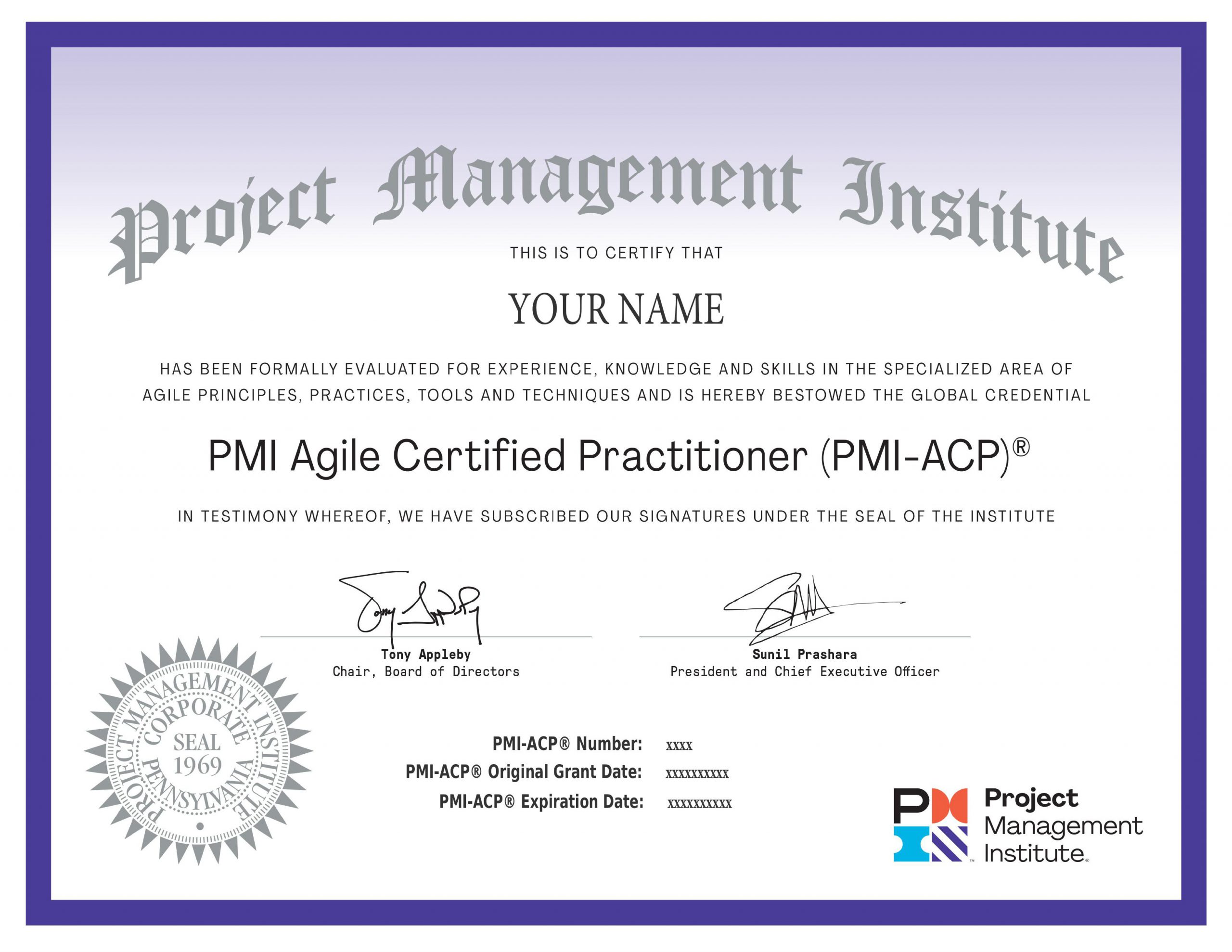30 Apr - 22 May
8:30 pm – 12:00 am (EDT)
3.5 hrs - Wed, Thu: 8 sessions
Virtual
$ 399
$
Program Highlights
Our PMI-ACP Certification Training is a blend of comprehensive resources, designed to support your success:
Core Agile Domains and Exam Weightage
Gain proficiency in the four key Agile competency domains that form the basis of the PMI-ACP Certification Exam:
Core Agile Domains and Exam Weightage
Gain proficiency in the four key Agile competency domains that form the basis of the PMI-ACP Certification Exam:
Enhance credibility with globally recognized Agile expertise.
Unlock career growth in Agile project management.
Stay competitive in evolving Agile-driven industries.
Project managers transitioning to Agile.
Scrum Masters looking to enhance their skills.
Product Owners seeking deeper Agile expertise.
Team leads adopting Agile delivery practices.
Business analysts working in Agile environments.
Agile coaches mentoring teams and organizations.
Consultants driving Agile transformations for clients.
Validates expertise in Agile principles and practices.
Demonstrates proficiency across multiple Agile frameworks.
Enhances credibility as a certified Agile professional.
Equips practitioners to lead Agile transformations effectively.
Builds skills in Agile mindset, leadership, product, and delivery.
Prepares professionals for real-world Agile project challenges.
Supports career advancement in Agile-driven industries.
To be eligible for the PMI-ACP® certification, candidates must meet the following requirements:
Educational Background: A secondary diploma (high school diploma, GED, associate’s degree, or global equivalent).
Formal Agile Training: 28 hours of formal training in Agile practices, frameworks, and methodologies. (Note: PMI will accept 21 hours for applications submitted until March 31, 2025).
Professional Agile Experience: Candidates must meet one of the following experience options:
Enroll in the PMI-ACP® Course
Access E-Learning Resources
Attend Live Sessions and Earn 28 Contact Hours Certificate
Complete and Submit the Exam Application
Practice with Mock Tests
Pay the Fee, Schedule, and Pass the Exam
Present that everyone has a shared understanding of agile values and principles
Illustrate eliciting and prioritizing functional and non-functional requirements to minimize the probability of failure.
Facilitate defining ground rules with all team members to encourage team commitment to shared outcomes.
Define work from the end-user point of view and minimize non-value-added work.
Facilitate working with business stakeholders to know their interests, needs, and expectations.
Evaluate feedback on the product by incremental delivery and frequent demonstrations to improve the product's value.
Present team processes by conducting frequent retrospectives.
Present progressive elaboration of top-level plans as the team moves forward.
Ensure plans are visible and transparent to increase commitment and reduce uncertainty.
Apply high team morale by discovering team and personal motivators and demotivates.
40+ Hours of Classroom-Style Video Content: Interactive whiteboard sessions to comprehensively explore Agile practices, frameworks, and methodologies.
180 Days of E-Learning Access: Access high-quality online resources at your convenience, designed to complement your certification preparation.
700+ PMI-ACP® Exam Questions: Practice with extensive mock tests aligned to the PMI- ACP® Exam Content Outline for robust exam readiness.
PMI-Authorized PMI-ACP® Exam Preparation Workbook: Detailed study material covering all aspects of the PMI-ACP® Exam Content Outline for in-depth understanding.
28 Hours of Live Virtual Classroom Training: PMI-prepared content delivered live, offering complete coverage of the PMI-ACP® Examination Content Outline.
Application Assistance: End-to-end support for filling out and submitting your PMI-ACP® application, ensuring accuracy and completeness
One-on-One Expert Session (Optional): Tailored guidance from seasoned trainers to address specific learning goals and challenges.
PMI-ACP® 28 Contact Hours Certificate: Officially recognized training hours to meet the eligibility criteria for the PMI-ACP® exam.
60 Professional Development Units (PDUs): Earn credits to renew your existing PMI certifications, such as PMP®, while gaining new skills.
Welcome to our classroom content outline! As a PMI-Authorized Education Provider, we deliver PMI’s proprietary and high-quality training content in our live classes. This content is specifically designed to equip participants with the knowledge and skills required to excel in the PMI-ACP Exam. Our program covers all domains of Agile practices for PMI-ACP Exam, ensuring a thorough understanding of Agile principles and frameworks.
The Agile Mindset domain, focuses on fostering the attitudes, principles, and behaviors essential for Agile success. Here are the core areas covered in this section:
1.1 Why Agile: We start by exploring the transition from industrial to knowledge work, emphasizing the unique demands of knowledge-based projects. Participants will learn:
1.2. Core Agile Principles: This part dives deep into the Agile Manifesto and its 12 guiding principles, connecting theory to real-world applications. Key takeaways include:
1.3. Experiment Early: Agile thrives on validating ideas through iterative and incremental delivery. Participants will:
1.4. Promoting Collaboration: Creating high-performing teams is at the heart of Agile. This module covers:
1.5. Building Transparency: Transparency ensures alignment and trust. Key topics include:
1.6. Psychological Safety and Embracing Change: Agile environments require trust and adaptability. In this segment, we explore:
1.7. Shortening Feedback Loops: Rapid feedback accelerates value delivery. Participants will:
The Agile Mindset section is the cornerstone of understanding and practicing Agile effectively,
ensuring participants are ready to apply these principles in both their PMI-ACP exam and real-world
Agile projects.
This section focuses on critical leadership competencies essential for Agile environments. Key areas include:
2.1. Empowering Teams:
2.2. Promoting Collective Ownership of Goals
2.3. Facilitating Problem Resolution
2.4. Training, Coaching, and Mentoring
2.5. Employing Emotional Intelligence
2.6. Facilitating Conflict Management
This comprehensive Leadership section equips participants with the skills needed to create empowered, cohesive teams capable of delivering value in complex Agile environments.
The Product domain focuses on refining and prioritizing product backlog items, managing increments, and ensuring the delivery of measurable value. Key topics covered in this section are:
3.1. Refining the Product Backlog
3.2. Prioritizing Backlog Items
3.3 Managing Increments
3.4. Visualizing Work
3.5. Managing Value Delivery
This section equips participants with the skills to refine, prioritize, and manage the product backlog while ensuring the delivery of high-value increments. The focus on backlog management, prioritization techniques, and value optimization ensures participants are prepared for both the PMI-ACP exam and real-world Agile projects.
4.1. Seek Early Feedback
4.2. Deliver Work in Small Increments
4.3. Optimize Flow
4.4. Manage Impediments and Risks
4.5. Recognize and Eliminate Waste
4.6. Perform Continuous Improvements
This section ensures participants understand how to deliver value efficiently while fostering continuous improvement. The focus on Agile metrics, stakeholder engagement, and iterative delivery equips participants to navigate complex project environments effectively.


Premium Authorized Training Partner of PMI (PMI ATP)

Best PMP-ACP® online Training Material to pass the exam in the shortest possible time

Trained instructors to support you end to end whenever you need

Mentored professionals across 30+ countries

1000+ Informational videos on our YouTube channel

55,000+ subscribers are getting the benefit

Query Handling Facility over Email and Phone

Continuous Support Through dedicated Forum

500+ enrollments every month

Dedicated Customer Support for PMI® Membership
iZenBridge’s PMI-ACP® certification training is designed to help you master Agile principles and practices, focusing on key competencies such as an Agile mindset, leadership, product delivery, and team management. The program includes 24 hours of live instructor-led sessions complemented by 32+ hours of self-paced learning, providing a flexible yet comprehensive learning experience. This training prepares you for the globally recognized PMI-ACP® certification exam, making you eligible to showcase your expertise in Agile approaches. It offers valuable insights into Agile methodologies such as Scrum, Kanban, and Lean, empowering you as a Project Manager, Team Leader, or Scrum Master to implement Agile practices effectively.
The difficulty of the PMI-ACP® exam largely depends on your experience with Agile.
Here’s a breakdown:
Compared to the PMP® exam, the PMI-ACP® exam is less challenging, often considered to be about 60% of PMP’s complexity level. While it still demands serious preparation and a clear understanding of Agile approaches like Scrum, Kanban, and Lean, the overall scope and depth are more manageable.
With the right study plan and resources, earning the PMI-ACP® certification is achievable, even for those new to Agile.
What Are the Current PMI-ACP® Exam Fees for Candidates in India?
PMI membership costs ₹9,020 per year. If you are not planning to pursue another certification or renewal with PMI this year, you may opt for the non-member fee. However, if you are considering obtaining another certification like PMP® or PgMP® or renewing your PMP certification within the year, getting a PMI membership can be more cost-effective as it gives you access to reduced exam fees and other benefits. Be sure to check the PMI website for the latest updates and details.
The PMI-ACP® exam consists of 120 questions in total:
• 100 scored questions that count towards your final result.
• 20 pretest (unscored) questions that are used to validate future exam questions. These
pretest questions are randomly distributed throughout the exam and do not impact your score.
What is the Passing Score for the PMI-ACP® Exam?
PMI does not disclose an exact passing score for the PMI-ACP® exam. Instead, your performance is evaluated based on proficiency levels across the four domains:
1. Mindset (28%)
2. Leadership (25%)
3. Product (19%)
4. Delivery (28%)
Your results are categorized as:
• Above Target
• Target
• Below Target
• Needs Improvement
To pass, you need to achieve a sufficient overall performance, typically at or above the “Target” level in most domains.
Our Benchmark:
Based on our experience with PMI-ACP® aspirants, we have observed that candidates who score 70% or more in our full-length mock tests consistently perform well in the actual exam. This benchmark serves as a reliable indicator of exam readiness and helps you gauge your preparation level effectively.
By focusing on Agile principles, frameworks, and practices, and aligning your preparation with mock tests, you can significantly improve your chances of success.
To earn PMI-ACP® certification, follow these steps:
1. Enroll with Us: Start by completing the required 28 contact hours through our training program. Learn Agile principles, methodologies, and practices, and access mock tests to ensure you’re ready for the exam.
2. Meet Eligibility: Have a secondary diploma and at least 1–2 years of Agile experience.
3. Apply: Fill and submit your application on the PMI website under our guidance to ensure it meets PMI’s requirements.
4. Schedule the Exam: Once PMI approves your application, choose an online or test center- based exam.
5. Prepare and Take the Exam: Use study resources and mock tests. Scoring 70% or more on practice tests indicates readiness. Complete the 120-question exam within 3 hours.
Join us to kickstart your journey and earn your globally recognized PMI-ACP® certification!
To fulfil the contact hour requirement for the PMI-ACP® exam, you need to complete formal Agile training from a recognized provider. Here’s how you can get started:
1. Enroll in Our PMI-ACP® Training: Our program offers 28 contact hours with comprehensive coverage of Agile principles, practices, and methodologies.
2. Interactive Learning: Participate in live instructor-led sessions or self-paced modules designed to deepen your Agile knowledge and skills.
3. Hands-on Exercises: Engage in practical exercises, case studies, and discussions to enhance real-world application.
4. End-of-Course Assessment: Complete the training, including quizzes and assignments, to receive a certificate verifying your contact hours.
By enrolling with us, you’ll not only meet the requirement but also prepare effectively for the PMI- ACP® exam with mock tests and expert guidance.
1. Enroll in a Comprehensive Training Program: Begin with our PMI-ACP® training program, which provides 28 contact hours that include live classes with experts for interactive learning and real-world application.
2. Use Our Self-Learning Videos: Gain additional flexibility by using our self-paced learning videos, designed to reinforce Agile concepts and frameworks at your convenience. These videos complement the live classes to ensure comprehensive preparation.
3. Understand the Exam Domains: Focus on the four domains—Mindset (28%), Leadership (25%), Product (19%), and Delivery (28%)—as outlined in the PMI-ACP® Exam Content Outline.
4. Study PMI-Authorized Resources: Utilize the Agile Practice Guide and PMI-approved materials to cover essential topics effectively.
5. Practice Mock Tests: Access our mock tests to evaluate your understanding and aim for a consistent 70% or above, a strong indicator of exam readiness.
6. Master Time Management: With 120 questions in 3 hours, practice answering efficiently to manage your time well during the exam.
7. Leverage Agile Experience: Apply your practical knowledge to confidently handle situational and scenario-based questions.
Enroll in our program for expert-led live classes, self-learning videos, and tailored mock tests to ensure you’re fully prepared to pass the PMI-ACP® exam on your first attempt!
You don’t need documented Scrum experience to register for PMI-ACP® certification training.
However, you must meet PMI’s Agile experience requirements to take the certification exam:
1. Agile Experience Requirements:
o If you hold a PMP® certification, no additional Agile experience needs to be
documented.
o Without PMP®, you need 2 years of Agile experience within the last 5 years.
o If you hold a third-party Agile certification (e.g., Scrum Master, SAFe) earned more than 1 year ago, you only need 1 year of Agile experience documented.
2. Training Hours: Complete 28 contact hours of Agile training, which we provide as part of our comprehensive PMI-ACP® preparation program.
Our training ensures you understand key Agile frameworks like Scrum, Kanban, and Lean, preparing you for the PMI-ACP® exam regardless of your prior Agile experience. Join us to get started!
PMI-ACP® certification does not have a specific book like PMBOK® for PMP®, and PMP itself is no longer solely based on PMBOK®. Instead, PMI provides an Exam Content Outline (ECO) for both certifications, which serves as the foundation for the exam content.
For PMI-ACP®, PMI has developed its own learning program materials, ensuring 100% alignment with the exam content outline. When you enroll with us, we use PMI’s authorized materials, including a detailed workbook for all four PMI-ACP® domains. This workbook, prepared by PMI, guarantees comprehensive coverage of the exam content, helping you confidently prepare for
success.
Typically, candidates prepare for the PMI-ACP® exam in 6 to 12 weeks, depending on their familiarity with Agile concepts and experience. The total preparation time usually ranges from 50 to 150 hours.
• If You Are Experienced in Agile: With solid knowledge of Agile principles and practical experience, you’re likely to need preparation on the lower side of the range (around 50–75 hours).
• If You Are New to Agile: Without prior exposure, you may require 100–150 hours to build foundational knowledge of
Agile frameworks like Scrum, Kanban, and Lean.
Enroll with us for structured training, PMI-authorized materials, and mock tests to streamline your preparation and achieve success!
It depends on the number of PDUs and their alignment with PMI-ACP’s requirements:
• PMI-ACP requires 28 hours of formal Agile education.
• During the transition period (until March 31, 2025), you can apply with 21 hours of Agile education, provided your application is submitted before this deadline.
• Ensure that your learning aligns with PMI-ACP’s new content domains (Mindset, Leadership, Product, and Delivery).
If you have previously earned PDUs that meet these criteria, you can use them. However, PMI recommends completing formal training through PMI Authorized Training Partners for consistency and better preparation.
PMI-ACP is ideal for professionals working in service-oriented industries managing diverse Agile frameworks like Scrum, Kanban, or Lean. It suits Agile leaders such as Delivery Leads, Team Leaders, Agile Coaches, and Project Managers involved in hybrid or multi-framework Agile environments. The certification focuses on mindset, leadership, product, and delivery, making it perfect for roles requiring versatility and leadership skills.
It is less suitable for those in pure Scrum-specific roles like Scrum Masters or Product Owners. For such roles, certifications like CSM or CSPO are more focused and relevant.
PMI-ACP and PMP cater to different needs. PMP is broader, covering predictive, adaptive, and hybrid methodologies, making it ideal for project leaders managing diverse project types. In contrast, PMI-ACP offers deeper insights into Agile frameworks like Scrum, Kanban, and Lean, emphasizing leadership, mindset, product, and delivery.
PMI-ACP is perfect for professionals focusing on Agile practices and leadership roles, while PMP provides general project management expertise. For Agile-focused practitioners, PMI-ACP complements PMP by offering greater depth. PMP is more popular and widely recognized, but PMI- ACP is better suited for Agile-specific environments and roles.
PMI-ACP and CSM/PSM cater to different Agile needs.
• CSM/PSM: Focus exclusively on Scrum, making them ideal for Scrum Masters or professionals working in strict Scrum environments.
• PMI-ACP: Covers multiple Agile frameworks like Scrum, Kanban, and Lean, with additional focus on leadership, mindset, product, and delivery, making it suitable for Agile leaders, team leads, and those working in hybrid frameworks.
If your role involves diverse Agile practices or leadership, PMI-ACP offers broader expertise. For roles centered only on Scrum, CSM/PSM is a more focused and quicker certification option.
The updated PMI-ACP (Nov 2024) certification retains around 70% of the original content while introducing new areas of focus to align with evolving Agile practices. Key additions include:
• Mindset: A deeper emphasis on Agile principles, complex adaptive systems, and tools like the Cynefin Framework.
• Leadership: New focus on coaching, mentoring, fostering psychological safety, and
promoting emotional intelligence for Agile leaders.
• Product and Delivery: Enhanced clarity on backlog refinement, metrics, and continuous
value delivery.
While core topics like Agile frameworks (Scrum, Kanban) remain, the revamped certification now prioritizes leadership, collaboration, and strategic decision-making to meet modern Agile demands
Yes, PMP-certified professionals can bypass the Agile experience requirement for PMI-ACP applications. However, they still need to complete the required 28 hours of Agile education (or 21 hours during the transition period).
• PMI-ACP: Focuses on Agile fundamentals, leadership, and cross-framework applicability. It’s ideal for building a strong foundation in Agile practices and versatile roles.
• SAFe Certification: Tailored specifically for Scaling Agile using the Scaled Agile Framework. SAFe offers role-based certifications (e.g., Scrum Master, Product Owner) and a general certification (Leading SAFe) for organizational agility.
If your organization practices SAFe, pursue SAFe certifications. However, a solid understanding of Scrum, Kanban, and Lean, covered extensively in PMI-ACP, is essential for mastering SAFe. Starting with PMI-ACP can provide a strong foundation for learning and applying SAFe principles effectively
Yes, PMI-ACP includes key leadership and coaching elements, making it an excellent starting point. for transitioning into Agile coaching roles. It provides a strong foundation in Agile principles, frameworks, and delivery practices, essential for coaching.
However, for deeper coaching and leadership skills, consider pursuing ICP-ACC (Agile Coaching Certification) after PMI-ACP.
• PMI-ACP: Develops Agile competencies like frameworks, mindset, and delivery practices.
• ICP-ACC: Focuses heavily on coaching and leadership competencies, such as mentoring, facilitation, and emotional intelligence.
Combining PMI-ACP and ICP-ACC ensures a comprehensive skillset for Agile coaching success.
While CSM and CSPO are useful for Scrum-specific roles, they are not validation-based certifications. The exams are relatively basic and can be taken from home without a proctor, which may not inspire strong trust in your Agile expertise.
On the other hand, PMI-ACP is a proctored certification with a rigorous exam structure that ensures certified individuals have a solid understanding of Agile concepts across multiple frameworks.
If your role involves leadership, delivery, or product management responsibilities beyond Scrum, or if you want to enhance your credibility in Agile knowledge, pursuing PMI-ACP after CSM or CSPO is a great way to expand your expertise and build trust. The focus of PMI-ACP is broader and ensures you are well-prepared for versatile Agile roles.
To be eligible for PMI-ACP certification, you must meet the following requirements:
1. Educational Background:
o A secondary diploma (high school diploma, associate’s degree, or global equivalent).
2. Agile Experience:
o 2 years of Agile experience in the past 5 years.
o Alternatively, 1 year of Agile experience if you hold an active third-party Agile certification (e.g., CSM, SAFe) earned more than one year ago or a degree from a PMI Global Accreditation Center (GAC) program.
o PMP-certified professionals are exempt from documenting Agile experience.
3. Formal Agile Training:
o 28 hours of Agile training from a quality source, covering Agile concepts like mindset, leadership, product, and delivery.
o During the transition period (until March 31, 2025), applications with 21 training hours will also be accepted.
The application process is conducted entirely through PMI’s official website, where you’ll need to input your education, Agile experience, and training details. In case your application is selected for audit, you may be required to provide supporting documents such as proof of training completion or experience validation. This ensures the integrity of the certification process while maintaining a smooth application experience for candidates.


Seema Sonkiya having approx. 13 years of experience in Scrum, Extreme Programming, lean, and others that fall under the Agile umbrella. She also has good exposure in busine...
Head Office: 526, Vipul Trade Center, Sector 48, Sohna Road, Gurgaon.
Training: (+91) 9958287711 | sales@izenbridge.com
Write a Review